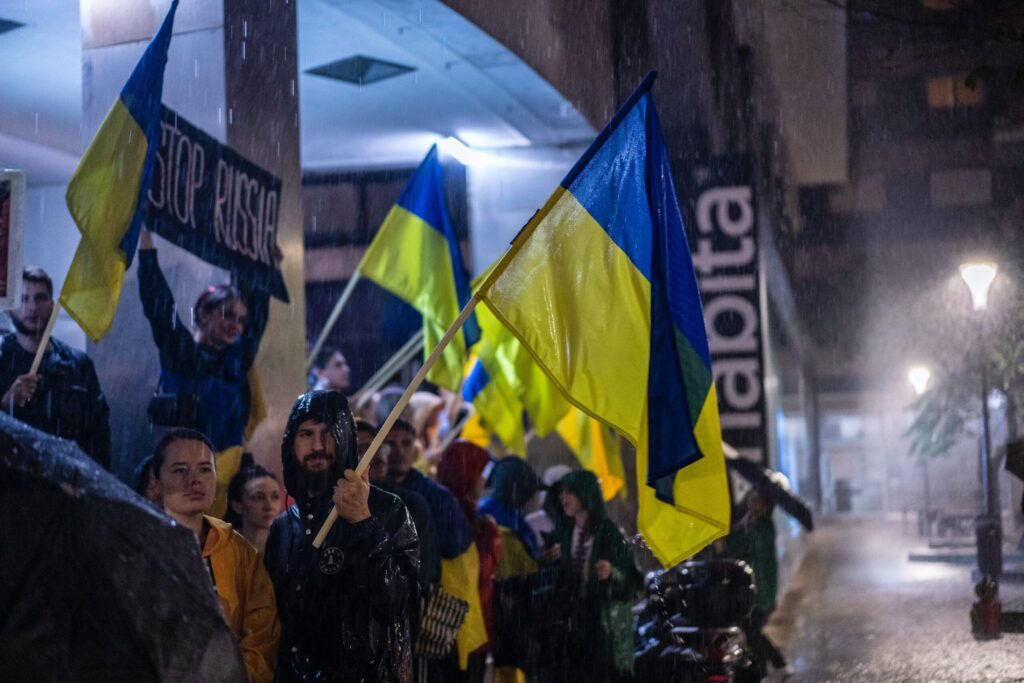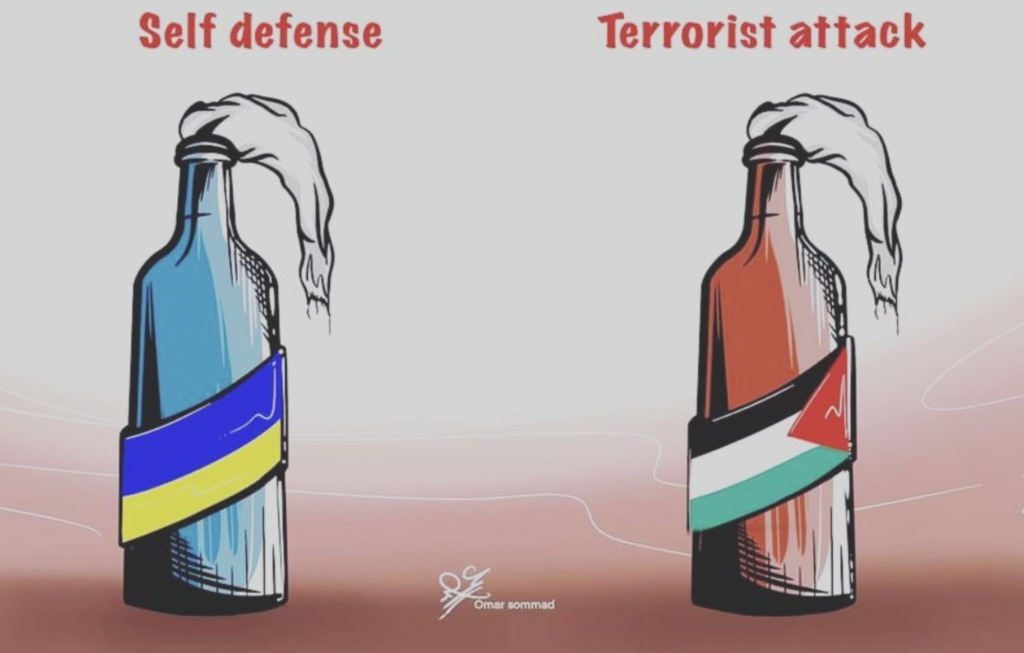“This is Not Iraq or Syria”: What Reactions to the Invasion of Ukraine Have Revealed About the Normalization of War in the Middle East

Image: Anastasiia Krutota
By: Dina Kobeissi / Arab America Contributing Writer
Following Russia’s invasion of Ukraine, people around the world are condemning Russia’s actions and expressing their support for Ukrainians. While this stance against war, defense of human rights, and call for the respect of autonomy are applaudable, one wishes for consistency in the world’s uproar. War, conflict, and bloodshed are nothing new for millions of people. One civilian is killed or injured every hour in Yemen. More than half a million people have been killed in the United States’ ongoing post-9/11 wars in Iraq, Afghanistan, and Pakistan. Palestinians experience apartheid daily. And yet, this news rarely makes top headlines or sparks international discourse. Accountability is not sought out. Justice is not demanded.
The disparate reaction to the crisis in Ukraine is glaringly evident to many Arabs and other non-Europeans who have experienced the normalization of their own suffering. Western media outlets have been complicit in undermining war and conflict in developing nations. Reflecting on 2019, mere minutes after Notre Dame was engulfed in flames, photos and videos flooded all news platforms. Leaving the building severely damaged but zero dead and three injured, the Notre Dame fire received intense media coverage and millions of dollars in donations as well as messages of solidarity from world leaders. However, little was written on Sudan where hundreds were killed or injured and thousands were missing during the political uprising happening at the same time as the fire. Jeff Cohen, founder of the media watch group Fairness and Accuracy in Reporting, provides additional insight as he explains “having worked inside mainstream U.S. media during the beginning of the ‘War on Terror’ and the run-up to the U.S. invasion of Iraq, the differences in today’s war coverage are dizzying.” He further remarked that “unfortunately, there was virtually no focus on civilian death and agony when it was the U.S. military launching the invasions.”
Orientalist Commentary in the Media
The prioritization of reporting on European hardship is only the beginning. Recently, repulsive orientalist remarks made on various media outlets by journalists and world leaders comparing the situation in Ukraine to the Middle East have brought to light the racism which fuels selective empathy and double standards.
In speaking of the situation in Ukraine, CBS News foreign correspondent Charlie D’Agata commented that “this isn’t a place, with all due respect, you know, like Iraq or Afghanistan that has seen conflict raging for decades…this is a relatively civilized, relatively European – I have to choose those words carefully too – the city where you wouldn’t expect that or hope that it’s going to happen.”
Ukraine’s Deputy Chief Prosecutor expressed that the situation “is very emotional for (him), because (he) see(s) European people with blue eyes and blonde hair being killed.”
In speaking of Ukrainians fleeing the destruction, Bulgarian Prime Minister Kiril Petkov told reporters, “these people are intelligent, they are educated people” and “this is not the refugee wave we have been used to, people we were not sure about their identity, people with unclear pasts, who could have been even terrorists…”
French journalist Philippe Corbe commented that “We’re not talking here about Syrians fleeing the bombing of the Syrian regime backed by Putin; we’re talking about Europeans leaving in cars that look like ours to save their lives.”
In an article written in The Telegraph by Daniel Hannan, Hannan comments that “They seem so like us. That is what makes it so shocking. Ukraine is a European country…War is no longer something visited upon impoverished and remote populations. It can happen to anyone.” “Ukraine is a European country. Its people watch Netflix and have Instagram accounts, vote in free elections, and read uncensored newspapers.”
While reporting for NBC, Kelly Cobiella decided to say, “Just to put it bluntly: these are not refugees from Syria. These are refugees from neighboring Ukraine. And that, frankly, is part of it. These are Christians, they’re white. They are very similar to people who live in Poland.”
An AlJazeera reporter commented, “What is compelling about these people is how they’re dressed; these are prosperous, middle-class people who obviously are not refugees.”
Despite some apologizing or retracting their statements, such comparisons reveal deeply rooted perceptions of white supremacy and normalization of war in the Middle East and have sparked outrage. In response to racist comments made in the media, most notably those which attempt to paint Arabs as uncivilized, people took to social media to highlight the richness of Arab history and culture. Ironically, despite being often referred to as the “cradle of civilization,” Iraq, one of the oldest inhabited places on Earth, was recently labeled an uncivilized nation in the media.
Image: Tweet by @adnanalsalihi
Many Arabs also posted themselves on social media with the caption “uncivilized” showcasing their countries, culture, and even degrees. Reclaiming the word became a form of empowerment at times providing a comedic relief in response to abhorrent comments made. Social media has proven to be an important tool in the fight to regain control of the narrative.
Image: Tweet by @btabarsimd
Disparate Treatment of Refugees
The racist remarks made in the media make apparent a hierarchical view of people with some believed to be more deserving of refugee status if their physical characteristics, as well as socioeconomic status, fit the descriptions of white and middle class respectively.
This sentiment has been especially disheartening when one thinks back to those who struggled to and continue to struggle with seeking refuge amidst war in their home countries. For example, Syrian refugees who moved to new countries worked extremely hard to succeed in their new homes and have been able to successfully contribute to society all the while facing racism and anti-Arab hostility. In fact, during the Syrian war, Poland, as well as Hungary and the Czech Republic, had refused to take in any Syrian refugees, and “many other refugees have faced unsympathetic treatment at the hand of authorities in France and the UK.” However, Poland has recently been a “key European voice amid the Ukraine crisis and has taken in the highest number of refugees — more than 1 million people in less than two weeks.” The blatant difference in treatment highlights how empathy and generosity are not extended to all the same way, but rather refugee policies have depended on factors like nationality, skin color, religion, and socioeconomic status.
Furthermore, racism’s effects on refugees has also been present within the borders of Ukraine where videos have surfaced revealing “thousands of African and Indian students stranded at the Polish border. They tried to board trains..they’re being stopped by Ukrainian officials.” Students and residents of Arab, African, and Indian nationalities in Ukraine told Euro-Med Monitor that they were “forced to sit for long hours at the Polish border without any help, and some of them—especially with black skin—were prevented from crossing without reasons and remained stuck at the borders.”
Double Standards in Activism

News coverage of civilian Ukrainians defending their country by making Molotov cocktails and arming themselves with state-given machine guns has also been celebrated as “heroic” and these people have been called “freedom fighters.” However, many have pointed out how Palestinians have resisted occupation and oppressive forces in similar ways, but they are painted as terrorists. Just two days ago, a 16-year-old Palestinian was shot dead by the IDF after throwing Molotov cocktails at a military post.
Another form of resistance has been the use of sanctions. Around the world, individuals and companies have decided to boycott Russian products in response to Russian aggression in Ukraine. Meanwhile, Western nations have refused to partake in sanctions against Israel in response to its human rights violations. Rather, they actively enable Israel through economic, military, and diplomatic support and even pass laws attempting to ban more participation in Israeli boycotts.
As Russian troops continue to fire rockets into Ukraine, the most horrific consequences will undoubtedly be felt by civilians. It is important to remember that one can sympathize with Ukrainians and stand against war while also calling out the evident devaluing of nonEuropean life. The double standards have not and will not go unnoticed, and for many, this entire situation has revealed immense irony and hypocrisy. It turns out countries around the world who constantly break international law do in fact know it exists, and choose when it is valid for application based on who is affected by its breaching. One message has become clear. The West is capable of condemning unjustified invasion and occupation, but only when the perpetrator isn’t them and only when the victims look like them.
Visit our blog here!


